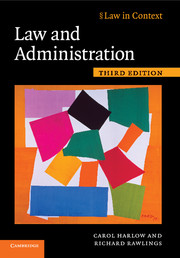Book contents
- Frontmatter
- Contents
- Preface
- Table of Cases
- Table of Statutes
- 1 Red and green light theories
- 2 The changing state
- 3 Transforming judicial review
- 4 Making the law
- 5 Rules and discretion
- 6 Regulation and governance
- 7 Regulatory design and accountability
- 8 Contractual revolution
- 9 Contract, contract, contract
- 10 Into the jungle: Complaints, grievances and disputes
- 11 Tribunals in transition
- 12 The Parliamentary Ombudsman: Firefighter or fire-watcher?
- 13 Inquiries: A costly placebo?
- 14 Continuity and change: Procedural review
- 15 Elite dimension: Court structures and process
- 16 Judicial review and administration: A tangled web
- 17 ‘Golden handshakes’: Liability and compensation
- Index
8 - Contractual revolution
Published online by Cambridge University Press: 05 June 2012
- Frontmatter
- Contents
- Preface
- Table of Cases
- Table of Statutes
- 1 Red and green light theories
- 2 The changing state
- 3 Transforming judicial review
- 4 Making the law
- 5 Rules and discretion
- 6 Regulation and governance
- 7 Regulatory design and accountability
- 8 Contractual revolution
- 9 Contract, contract, contract
- 10 Into the jungle: Complaints, grievances and disputes
- 11 Tribunals in transition
- 12 The Parliamentary Ombudsman: Firefighter or fire-watcher?
- 13 Inquiries: A costly placebo?
- 14 Continuity and change: Procedural review
- 15 Elite dimension: Court structures and process
- 16 Judicial review and administration: A tangled web
- 17 ‘Golden handshakes’: Liability and compensation
- Index
Summary
Forty years ago, contract was a low-lying feature in the administrative law landscape. This mirrored state forms, at the time the classic welfarist model of direct service provision by integrated, hierarchical, public bodies. It also reflected the non-development of a distinctive ‘public law’ body of legislation and jurisprudence. On the one hand, Dicey dominant, the basic premise was that government contracts should be subject to the ordinary private law; on the other, a history of Crown immunities and privileges reinforced the sense of an internal, executive-owned activity devoid of formal legal regulation. Public procurement in its traditional format of buying in goods and services was both big business and largely hidden from view. Behind the scenes, a well-established ‘law of the contract’ was in operation, a reservoir of standard terms and conditions on which officials could draw when specifying performance and to anticipate disputes.
Today in contrast, contract and regulation are twin pillars of the new architecture of governance. Underpinning the development is the capacity of this great instrument of economic exchange for multi-tasking. In the guise of ‘pseudo-contract’ (see p. 198 above) it is a way of modelling institutional relations (all those MoUs). Under the broad rubric of ‘contracting out’ it is the vehicle for the delivery of many public services. And as a repository for rules, principles and standards it functions as an alternative source of regulation.
- Type
- Chapter
- Information
- Law and Administration , pp. 338 - 392Publisher: Cambridge University PressPrint publication year: 2009



